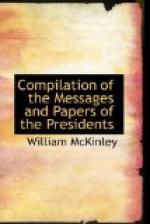This extreme test was, in fact, applied in the case of Texas. The Congress to whom President Jackson referred the question as one “probably leading to war,” and therefore a proper subject for “a previous understanding with that body by whom war can alone be declared and by whom all the provisions for sustaining its perils must be furnished,” left the matter of the recognition of Texas to the discretion of the Executive, providing merely for the sending of a diplomatic agent when the President should be satisfied that the Republic of Texas had become “an independent state.” It was so recognized by President Van Buren, who commissioned a charge d’affaires March 7, 1837, after Mexico had abandoned an attempt to reconquer the Texan territory, and when there was at the time no bona fide contest going on between the insurgent province and its former sovereign.
I said in my message of December last:
It is to be seriously considered whether
the Cuban insurrection
possesses beyond dispute the attributes
of statehood, which alone
can demand the recognition of belligerency
in its favor.
The same requirement must certainly be no less seriously considered when the graver issue of recognizing independence is in question, for no less positive test can be applied to the greater act than to the lesser, while, on the other hand, the influences and consequences of the struggle upon the internal policy of the recognizing state, which form important factors when the recognition of belligerency is concerned, are secondary, if not rightly eliminable, factors when the real question is whether the community claiming recognition is or is not independent beyond peradventure.
Nor from the standpoint of expediency do I think it would be wise or prudent for this Government to recognize at the present time the independence of the so-called Cuban Republic. Such recognition is not necessary in order to enable the United States to intervene and pacify the island. To commit this country now to the recognition of any particular government in Cuba might subject us to embarrassing conditions of international obligation toward the organization so recognized. In case of intervention our conduct would be subject to the approval or disapproval of such government. We would be required to submit to its direction and to assume to it the mere relation of a friendly ally.
When it shall appear hereafter that there is within the island a government capable of performing the duties and discharging the functions of a separate nation, and having as a matter of fact the proper forms and attributes of nationality, such government can be promptly and readily recognized and the relations and interests of the United States with such nation adjusted.
There remain the alternative forms of intervention to end the war, either as an impartial neutral, by imposing a rational compromise between the contestants, or as the active ally of the one party or the other.




